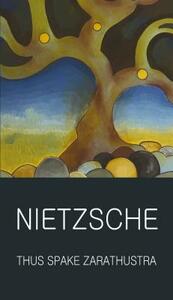Take a photo of a barcode or cover
I'm still somewhat on the fence about the narrative style Nietzsche chose for his "master piece". While I generally prefer a methodological, clear, and simple description especially when it comes to the "big questions" and "great ideas", I do recognize that one of Nietzsche's major concern was to make the reader think and question pretty much everything, including his (Nietzsche's own) ideas. "Also sprach Zarathustra" is filled to the brim with religious imagery and metaphors and he chooses to fill words a very different meaning than one might be used to, all this works well for a reader that is on her toes to begin with but someone approaching his work more naively might easily get the wrong impression... As for Nietzsche's ideas itself, some are appealing, some are repulsive, but almost all of them are worth of consideration.
I do not have a lot to say about this book. Perhaps the cause is my lack of philosophical training, over all background in Nietzschian philosophy, or a product of a particularly bad translation. No matter what the cause, I did not find a lot in this novel that I found particularly thought provoking, interesting, or entertaining.
There isn't much to the plot. The writing style, perhaps driven by translation choices, was a pale imitation of religious tracts which gave the impression that it was trying too hard to be profound and failing to do so.
Obviously this is a book of great philosophical import but I cannot bring myself to recommend it to someone with a lack of background necessary to appreciate it.
There isn't much to the plot. The writing style, perhaps driven by translation choices, was a pale imitation of religious tracts which gave the impression that it was trying too hard to be profound and failing to do so.
Obviously this is a book of great philosophical import but I cannot bring myself to recommend it to someone with a lack of background necessary to appreciate it.
adventurous
challenging
dark
emotional
funny
hopeful
informative
inspiring
lighthearted
mysterious
reflective
relaxing
sad
tense
slow-paced
adventurous
inspiring
reflective
slow-paced
This book is intentionally written to obfuscate meaning. It's a perfect example of what people are talking about when they say they don't like Continental philosophy. I mean, Nietzsche does say in the book that knowledge that was fought to be obtained is better (but once again, in very obscure language), so he's being consistent, but in this case I super disagree with him. It is true that knowledge becomes more internalized if you have to think about it for a long time, like a complicated equation that you have to solve practice problems to understand, but when you're simply trying to convert a jumble of pseudo-religious metaphor into an intelligible sentence it's a completely irrelevant form of struggle.
Furthermore, I'm actually of the opinion that this book is mostly popular because it came about at the right time in the right place. The need for an explicitly anti-religious philosophy was tied to the zeitgeist of the time, and this book happened to be published then. But there's been tons of better and more developed non-religious philosophy throughout time, from stoicism to Zen Buddhism. Some of this book's themes, about rejecting religious value frameworks and such, are lacking in philosophical rigor and sound more like rants than anything. The whole Ubermensch thing is overplayed in pop culture too, in my opinion. Nietzsche's Ubermensch is poorly defined, and despite being described in super glowing and allegoric language, appears to have no real properties aside from not having religious values. It's not clear why Nietzsche thinks this is such a great thing, as opposed to just something neutral.
Overall, I think this book is a waste of time and I don't see any benefit in reading it other than for historic and pop-culture value.
Furthermore, I'm actually of the opinion that this book is mostly popular because it came about at the right time in the right place. The need for an explicitly anti-religious philosophy was tied to the zeitgeist of the time, and this book happened to be published then. But there's been tons of better and more developed non-religious philosophy throughout time, from stoicism to Zen Buddhism. Some of this book's themes, about rejecting religious value frameworks and such, are lacking in philosophical rigor and sound more like rants than anything. The whole Ubermensch thing is overplayed in pop culture too, in my opinion. Nietzsche's Ubermensch is poorly defined, and despite being described in super glowing and allegoric language, appears to have no real properties aside from not having religious values. It's not clear why Nietzsche thinks this is such a great thing, as opposed to just something neutral.
Overall, I think this book is a waste of time and I don't see any benefit in reading it other than for historic and pop-culture value.
This book sparked a lifeline no love of Philosophy, though Nietzshe has severe moments of sexism. However, this is typical of the time period and he is still a revolutionary. Many of his quotes inspire me on a regular basis!
challenging
mysterious
reflective
tense
slow-paced
Some insights I liked reading and felt were really thought out, but others I was skeptical about or just did not approve/believe. I'm definitely not going to understand all of the metaphors, but I also don't feel the desire or need to. The sermon type parts were frankly boring and made the book so so long, but I really enjoyed the sections of real narrative story of Zarathustra interacting with people more than just talking at them, and that was the main reason I kept reading.
I was a big fan of the opening of the story, and found that Zarathustra was a very likable and sweet character in some of his interactions with others, and there were plenty of funny and playful moments that surprised me but were definitely the better parts of the book. Of course Zarathustra gets weird and mad and is obsessed with his ideas, but he also loves animals and wants to have friends. He's just a silly, goofy, lonely guy.
There were also some fun references to biblical New Testament quotes and ways the NT was written, such as the reference to parables, disciples, and especially the disciple Zarathustra "loved most" which references John and Jesus (XLI).
While the writing was purposefully difficult, I enjoyed many sentences from this book:
"But one day will the solitude weary thee; one day will thy pride yield, and thy courage quail. Thou wilt one day cry: "I am alone!"" (XVII)
"Thus spake the devil unto me, once on a time: "Even God hath his hell: it is his love for man." And lately, did I hear him say these words: "God is dead: of his pity for man hath God died."---"(XXV)
I really loved the term "tarantula-hearts" from chapter XXIX.
"'Tis night: now do all gushing fountains speak louder. And my soul also is a gushing fountain. 'Tis night: now only do all songs of the loving ones awake. And my soul also is the song of a loving one...Ah, that I were dark and nightly! How would I suck at the breasts of light!" (XXXI)
"There are on the earth many good inventions, some useful, some pleasant: for their sake is the earth to be loved. And many such good inventions are there, that they are like woman's breasts: useful at the same time, and pleasant." (LVI--XVII)
I was a big fan of the opening of the story, and found that Zarathustra was a very likable and sweet character in some of his interactions with others, and there were plenty of funny and playful moments that surprised me but were definitely the better parts of the book. Of course Zarathustra gets weird and mad and is obsessed with his ideas, but he also loves animals and wants to have friends. He's just a silly, goofy, lonely guy.
There were also some fun references to biblical New Testament quotes and ways the NT was written, such as the reference to parables, disciples, and especially the disciple Zarathustra "loved most" which references John and Jesus (XLI).
While the writing was purposefully difficult, I enjoyed many sentences from this book:
"But one day will the solitude weary thee; one day will thy pride yield, and thy courage quail. Thou wilt one day cry: "I am alone!"" (XVII)
"Thus spake the devil unto me, once on a time: "Even God hath his hell: it is his love for man." And lately, did I hear him say these words: "God is dead: of his pity for man hath God died."---"(XXV)
I really loved the term "tarantula-hearts" from chapter XXIX.
"'Tis night: now do all gushing fountains speak louder. And my soul also is a gushing fountain. 'Tis night: now only do all songs of the loving ones awake. And my soul also is the song of a loving one...Ah, that I were dark and nightly! How would I suck at the breasts of light!" (XXXI)
"There are on the earth many good inventions, some useful, some pleasant: for their sake is the earth to be loved. And many such good inventions are there, that they are like woman's breasts: useful at the same time, and pleasant." (LVI--XVII)
funny
reflective
slow-paced
Neo-Jesus babbles on about the Ubermensch for 300 pages




